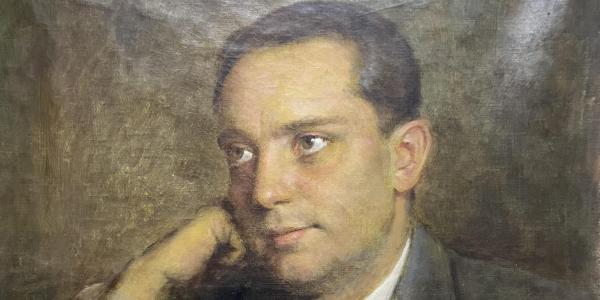A new distinguished professorship honors Hungarian-born author and journalist Bela Kornitzer. His life and career inspired his niece, a longtime WashU supporter, to keep his legacy alive.

In January, Diana Z. O’Brien, professor of political science, will be formally installed as the inaugural Bela Kornitzer Distinguished Professor, an appointment made possible thanks to a significant pledge from longtime WashU supporter Noémi Neidorff.
Neidorff created the distinguished professorship in memory of her uncle, Bela Kornitzer, an acclaimed author, historian, and journalist from Hungary. Noémi and her late husband, Michael Neidorff, have been champions of WashU and the St. Louis community for decades.
“I am especially pleased about Diana’s appointment,” Neidorff said. “Obviously, her accomplishments and credentials are most impressive, but I also know that my Uncle Bela would have enjoyed her warm, outgoing, and effervescent personality.”

O’Brien studies the causes and consequences of women’s political representation in democracies across the globe. Her research examines gender and political parties, executive branch politics, and how citizens respond to women in politics. She said she feels a special connection to Neidorff and Kornitzer. All three are immigrants to the U.S., an experience that “fundamentally influences your worldview.” And, like Kornitzer, O’Brien is deeply intrigued by political institutions. “Kornitzer used his journalistic prowess to interview politicians to better understand political leadership,” O’Brien said. “I use the tools of social science to try to answer some of the same questions.”
The journalist had a reputation for building relationships with political figures that enabled him to get exclusive interviews with the likes of Albert Einstein, Harry S. Truman, and Douglas MacArthur.
“I feel tremendously honored to be the inaugural recipient of this professorship,” O’Brien said. “Bela Kornitzer’s work demonstrates his deep commitment to upholding — and understanding — democracy and democratic values. I hope that my research and teaching will honor this legacy.”
Bela Kornitzer's life and career
1910: Bela Kornitzer is born in Szerencs, Hungary.

Courtesy of Drew University
Mid-1920s: Kornitzer leaves home for Budapest. His early published works — printed in the city’s major newspaper — are sketches and short commentaries of prominent men. An editor at the paper advises him to pursue journalism, and Kornitzer goes on to become the reporter-commentator in the Hungarian parliament for about a decade.
1940: “Fathers and Sons,” Kornitzer’s two-volume book on the influence of autocratic fathers on their sons, is published in Hungary. It becomes a standard textbook in Hungarian schools until the Nazis take control of the government and order it burned.
When Nazis occupy Hungary, Kornitzer uses his significant connections to obtain false identifications for himself and his sister, Alicia. Neither wears the mandatory yellow star, and together they seek shelter for members of their family. Kornitzer also requests protection for 100 Jewish families and is later credited with saving their lives.
1947: Kornitzer becomes a high official in the post-war Hungarian cabinet but is quickly ousted when Communists claim that his writings “strengthened the forces of rebellion.” The Arrow Cross Party, a Hungarian fascist organization, places him on their “most wanted” list, and he escapes Hungary. Kornitzer becomes the first Hungarian official to seek exile in the United States after World War II. He learns English by going to the movies: “Very fine teachers I had,” he once remarks. “Betty Grable, Humphrey Bogart, and Jimmy Cagney.”
1952: Kornitzer publishes his first book in English, “American Fathers and Sons.” It includes 14 biographical sketches of famous Americans in government, science, and the arts, examining their relationships with their fathers. The same year, NBC broadcasts his interview of Robert Frost. “At Home with Robert Frost” covers Frost’s poetry, his relationship with his father, and his views on America and democracy.
1955: “The Great American Heritage: The Story of the Five Eisenhower Brothers,” Kornitzer’s book on the Eisenhower family, is published. Kornitzer was interested in exploring family dynamics to understand American democracy, believing that the family unit functioned as a tiny democratic state.

Courtesy of Drew University
1960: “The Real Nixon,” a biography tracing the events that led to Richard Nixon’s national prominence, is published. Kornitzer sought to demonstrate how American democracy begins at home and how family values contributed to America’s heritage.
1964: Kornitzer, 53, dies of a sudden illness, and his obituary is published in The New York Times.
1991-1992: Kornitzer’s sister, Alicia Karpati, donates the archive of Kornitzer’s work to the library of Drew University. Karpati and her husband also create an endowment for the Bela Kornitzer Award at the university.
2023: Noémi Neidorff pledges to establish the Bela Kornitzer Distinguished Professorship in Arts & Sciences at Washington University.
2024: Diana Z. O’Brien will be installed as the Bela Kornitzer Distinguished Professor. A Kornitzer Research Symposium will feature cutting-edge political science research on topics related to Kornitzer’s life and work.
Sources: The New York Times, Drew University, Noémi Neidorff, Diana Z. O’Brien





